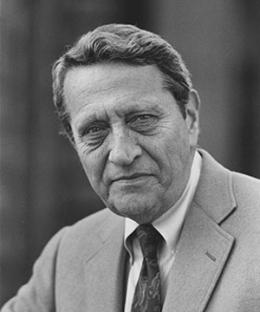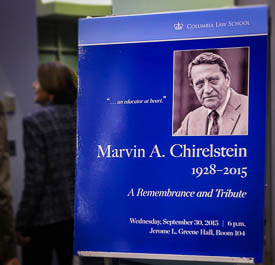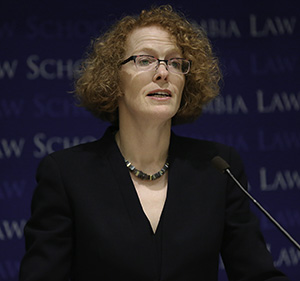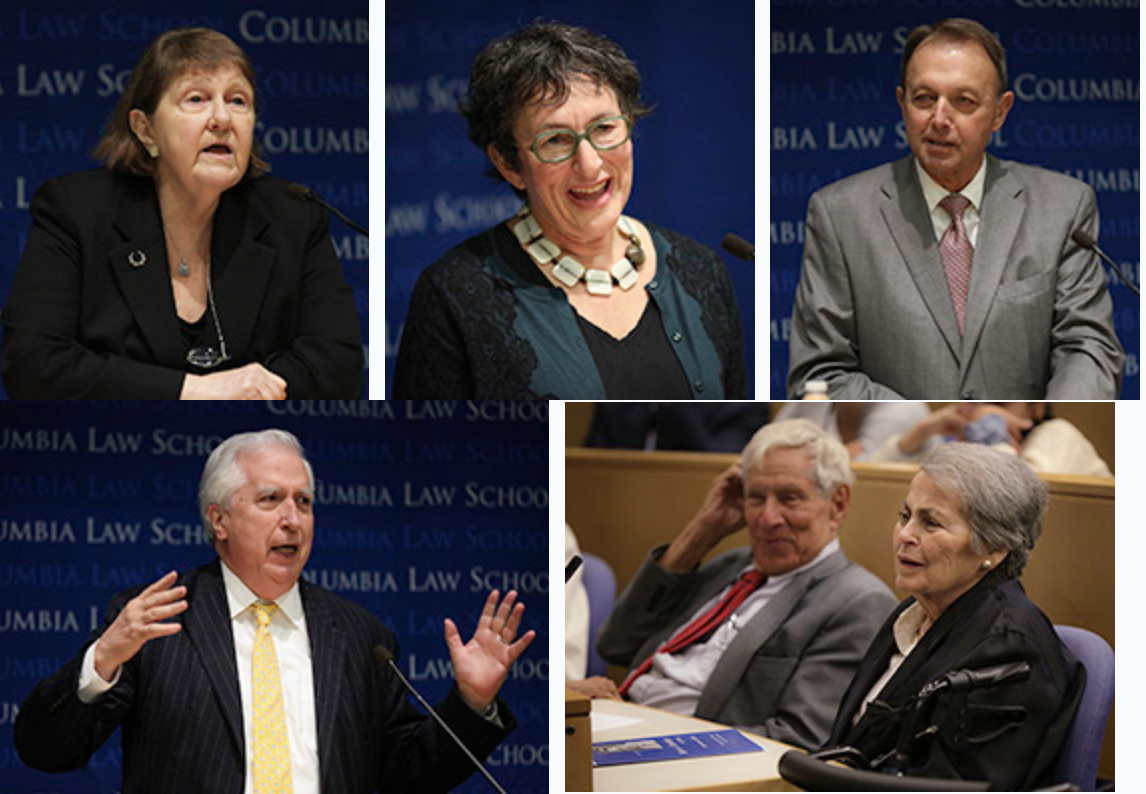

Throughout his half century teaching career, Columbia Law School Professor Marvin A. Chirelstein would often shuffle back and forth at the front of a classroom, mumbling under his breath that the material for the day was boring—so obvious he could hardly get through it.
His shtick reflected students’ fears that studying tax or contract law would prove less than exciting.
“In fact,” said Stephen B. Cohen, a tax law professor at Georgetown University Law Center who studied under Chirelstein, “he was never boring and what he said was never obvious. With each class, like magic, he provided insights that none of us could anticipate or figure out without him. The intellectual content was stunning.”
Cohen spoke, along with several other of Chirelstein’s former students and longtime colleagues, at a memorial service held to honor the beloved professor, who died in February at the age of 86. Chirelstein, a leading scholar of federal taxation, corporate law, and contracts who taught at Rutgers School of Law and Yale Law School in addition to Columbia, penned textbooks that professors across the country still teach from today. He was a man at home in the front of the class, revered by students and fellow professors alike.
Gillian Lester, Columbia Law School’s Dean and the Lucy G. Moses Professor of Law, described her introduction to Chirelstein: He authored Concepts and Case Analysis in the Law of Contracts, a primer she assigned as a new professor at UCLA School of Law.
“I held up the book, and I said to my students, ‘This is not required reading, but I commend it to you,’” she remembered. “And every time I’ve taught contracts, I have commended Marvin Chirelstein’s book and reread it. And every year I’ve felt the same rich reward from the wry humor, the incisiveness, the tremendous analytic power. Marvin Chirelstein really lit up contracts for me, and he allowed me as a teacher to light it up for my students.”
Chirelstein’s wife, Ellen, and son, Paul, were in attendance at the memorial, as were dozens of other people whose lives he touched, including a friend Chirelstein made in kindergarten at the Francis W. Parker School in Chicago. The speakers—Cohen; Senior U.S. Court of Appeals for the Second Circuit Judge Guido Calabresi; Columbia Law School Professors John C. Coffee Jr., Robert E. Scott, Carol Sanger, and Dean Emerita Barbara Aronstein Black ’55; and Yale Law School Professor Roberta Romano—brought pages of emails and letters they exchanged with Chirelstein over the years and notes about unforgettable interactions. He was remembered in story after story for his modesty, his generosity, and his humor—what Cohen called his “unabashed irreverence.”
Sanger, whom Chirelstein posthumously arranged to take over Concepts and Case Analysis in the Law of Contracts, said she and Chirelstein had started a “contracts perplexion” discussion group at the Law School that ultimately became a social club with several other faculty and their significant others. She said she and Chirelstein wrote to each other often to debate the merits of teaching some contracts case or another.
The subject of one email from Chirelstein about Plante v. Jacobs, a case involving a dispute over unfinished suburban tract housing, was “Emily D.” In the body, Chirelstein quoted from a few lines of one of Emily Dickinson’s poems: “I dwell in Possibility – a fairer House than Prose – More numerous of Windows – Superior –for Doors...” He ended the email, “Last two lines somehow relevant to Plante v. Jacobs.”
Coffee, who took two courses with Chirelstein as a student at Yale, said his former teacher was a man of many passions. He taught a course on boxing and the law—which Coffee joked should be converted into a clinic—and started the Law School’s short-lived string quartet, in which Chirelstein played, characteristically given his self-deprecating style, second fiddle.
After Chirelstein died, Coffee visited his office to see what his friend had seen every day: a portrait of his wife, Ellen, on their wedding day, photos and news clippings of the boxers Sugar Ray Robinson and Willy Pep, and a picture from a 1925 horse race at Hialeah.
Coffee said Chirelstein studied the New York Daily News racing form every day in the faculty lounge, often trying to convert Coffee into a fan.
“If I heard him say it once, I heard him say it 20 times: He wanted his ashes buried at the 8th furlong pole at Belmont,” Coffee said, prompting laughter throughout the room. “That is one of the few ambitions he’s not going to realize.”
Romano, another former student at Yale, said Chirelstein changed the course of her life.
“I would not be doing what I’ve been doing for the past 30 plus years if I had not taken Marvin’s courses. I would also venture to say that’s true of other lawyers and law professors, including many speakers today and many individuals who are present,” she said, noting that Chirelstein brought her on as a research assistant during a time when women were regularly passed over for such opportunities. “His genuine affection for students is a key to understanding his tremendous classroom success and his formative impact.”
Former President Bill Clinton, who also studied under Chirelstein at Yale (and was forgiven by him for reading One Hundred Years of Solitude in class), sent a note that Dean Lester read at the memorial service in which Clinton said he would “always be grateful for Professor Chirelstein’s gifted teaching, endless curiosity, and generous spirit.” Dean Lester read another message from one of Chirelstein’s former colleagues at Rutgers, U.S. Supreme Court Justice Ruth Bader Ginsburg ’59.
“Marvin was the best of colleagues,” Ginsburg wrote. “His marvelous sense of humor could make even the most sober jurist smile.”
Chirelstein found a way to reach even those far from his own campus. Professor Scott recalled his first Chirelstein experience: In 1980, Chirelstein, then at Yale, wrote a letter to Scott at the University of Virginia School of Law in response to a piece about contract law theory Scott published. Scott read from the brief letter at the memorial:
“‘Dear Professor Scott, I have just read your excellent article “Enforcing Promises” in the Yale Law Journal. I congratulate you on a magnificent attempt to rationalize the law of contracts although I fear that in the end the effort is ultimately futile,’” Scott read. “‘Sincerely, Marvin Chirelstein.’”
So began years of correspondence and friendship that grew stronger when the men were both teaching at Columbia. One note Scott received from Chirelstein was about a tax professor who was thinking about joining the Law School but was hesitant because no named chair was available for him. Chirelstein told Scott he would give up his own title. He signed the letter: Marvin Chirelstein, Professor of Law, No Chair.
The speakers all referred fondly to—and confessed missing greatly—Chirelstein’s way of seeing the world. Sanger called it “a very Marvin state of mind.”
Calabresi said Chirelstein had first shown him that special perspective in an estate and gift tax class Calabresi was teaching that unexpectedly elicited some very novel responses from students. Chirelstein asked Calabresi what he had done differently, and Calabresi admitted to teaching the class materials in a “non-canonical” order because the mimeograph machine—“that thing that smelled of purple”—was broken one day.
“Marvin—the gifted teacher—immediately saw: If you move the furniture around, change your place, your stance, your order of things, you and others kneeling with you might just come up with something new,” he recalled. “This has helped me enormously whenever I’ve done something original. And when I move the furniture around, I think of Marvin.”


